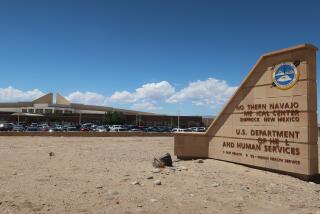BOOK REVIEW : A Free Fall Through the Health-Care Gap : MAMA MIGHT BE BETTER OFF DEAD: The Failure of Health Care in Urban America <i> by Laurie Kaye Abraham</i> ,University of Chicago, $22.50, 302 pages
- Share via
Health care is much on people’s minds these days, as President Clinton’s health-care reform package has everyone wondering how the way they get well is going to change.
Every self-interest group has a suggestion or a gripe, from the recently unemployed auto worker who applauds the stability of a national health plan, to the wealthy private physician who would rather retire than endure the indignity of participating in managed care.
But Laurie Kaye Abraham, in her compelling book “Mama Might Be Better Off Dead,” suggests that a long-ignored segment of the population falls outside any health-care program--in part because years of bureaucratic neglect have made them cynical and weary of the effort it takes to find decent care; in part because that care too often is denied them, despite their dogged attempts.
The author spent a year in the frightening medical wasteland of North Lawndale, Ill., a poor black Chicago neighborhood where follow-up care is a cruel joke, common courtesy an expensive luxury and funding a vicious maze that encourages unemployment and divorce. And guess what? North Lawndale has sister cities all over the country.
“Mama Might Be Better Off Dead” tells the story of Jackie Banks and her family, and their attempts to hold the family’s health together. Her aging grandmother, who raised her, has just suffered the amputation of one leg because of uncontrolled diabetes that might have been better treated, and her other foot now looks bad. Banks’ father, who only drops by when he needs help, suffered a stroke in his 40s because he didn’t heed warnings about his high blood pressure. And Jackie’s husband has a progressive kidney disease that might have been slowed if it had been discovered earlier; he gets up before dawn several times a week to travel to a dialysis center, since home dialysis seems beyond the family’s resources.
Abraham spent a year with the family, unraveling a system so complex that some patients simply give up and become victims, not only of illness, but of red tape.
The welfare system is full of Catch-22s: If Jackie’s grandmother reports income she made she would have to pay more for her medical care; if Jackie’s family income increases enough to get them off the blasted block they live on, and onto the marginally nicer block that Jackie yearns for, much of the money would go to doctor bills. Defeated before they start, they stay where they are.
But the more subtle, and infinitely sadder, problems have to do with how they get treated once they find a doctor.
Anyone who has sat through a physical while an internist took a complete medical history will wince at the blithe indifference shown to Abraham’s subjects. Doctors fail to ask about the past and forget to follow-through about the future.
There are some luminous heroes, certainly, doctors who could have been making a cushy living elsewhere but saw the need at the Mount Sinai emergency room--but for every one of those there is a handful of marginal cases, doctors with diplomas from shadowy foreign medical schools, doctors who have figured out how to make the welfare system pay off for them without having to make much of a commitment to the patients.
Abraham has done prodigious research, and her grasp of the Banks family’s dizzying ride is formidable. But her greatest strength, her focus and attention to detail, turns out to be the book’s one weakness.
She has set herself a difficult task--a process book, driven by the narrative of her year with the Bankses, that also provides an overview of this country’s health-care policies--and sometimes the swing from anecdote to analysis doesn’t work.
More often than is necessary, she steps back to remind the reader that our health-care system is unfair and insufficient to the needs of poor people, and that this neglect perpetuates the problems that plague them. It is hard not to say, “Stop. I know that already. You can go on with your story.”
It is also hard not to wish for a bit more information from the other side, from the doctors who do care about quality of care. Their frustration must be monumental, and they see the system’s flaws from another perspective--one that would have provided an interesting counterbalance to what the Bankses had to say.
Still, the book is a powerful indictment of the big business of medicine, one that could not have been better-timed.
As Abraham points out, there is a subculture in this country--an ethnic underclass--that simply gets sicker more often than middle-class whites. With some diseases it’s a matter of genetic predisposition but with others, it’s only because proper diagnosis and treatment are not always available.
Jackie Banks’ grandmother died of unnatural causes--of diabetes and neglect, of high blood pressure and ignorance that the doctors she encountered did little to ameliorate. Her obituary might as well have listed “poverty” as the official cause of death.
More to Read
Sign up for Essential California
The most important California stories and recommendations in your inbox every morning.
You may occasionally receive promotional content from the Los Angeles Times.













